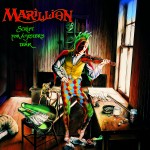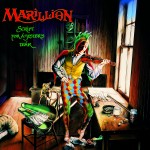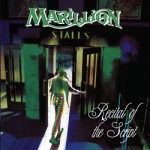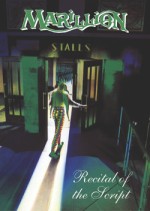Current & Notable Release Versions:
4CD / 1 BR Deluxe Edition (2020): features a brand new stereo remix of the album, the Market Square Heroes EP and the track "Charting The Single" by Andy Bradfield & Avril Mackintosh. Also includes the previously unreleased show from the Marquee Club, London on the 29th December 1982 and a blu-ray containing 96k/24-bit audio of the Script & Market Square Heroes EP and the Marquee show.
It also includes a 5.1 surround mix of Script by Andy Bradfield & Avril Mackintosh and "Sackcloth & Greasepaint" - a new in depth 90 minute documentary covering the formation of the band through to the release of Script in 1983, containing interviews with Fish, Mark Kelly, Diz Minnit, Mick Pointer, Steve Rothery, Pete Trewavas and Mark Wilkinson. OUT OF PRINT.
4LP Deluxe VInyl Edition (2020): features a brand new stereo remix of the album, the Market Square Heroes EP and the track "Charting The Single" by Andy Bradfield & Avril Mackintosh. Also includes the previously unreleased show from the Marquee Club, London on the 29th December 1982. OUT OF PRINT.







When I joined Marillion in November 1981 some of the material that was to become the album 'Script for a Jester's Tear' had already been written. 'The Web' and 'Forgotten Sons' had a long history of metamorphosis going back a number of years. In most gigging bands, as the musicians became bored playing the same songs night after night, or line-up changes caused certain songs to be dropped from the set,it was normal practice to recycle and reuse the best bits in new compositions. Two casualties around the time I joined - never to resurface - were 'The Madcaps Embrace' and 'Skyline Drifter'. The song 'Close' became 'The Web', and 'Alice' the end section of 'Forgotten Sons'. This was before the advent of the CD made it possible for unsigned bands to produce a limited run of their earliest writing attempts, call it an album and sell it at gigs. It would have been nice to have had that possibility as a struggling band gigging up and down the country, with no record company interest, but then again, some songs are best left unrecorded.
Although Three Boats didn't make it onto the album, it became, along with 'Grendel', the B side of our first single, 'Market Square Heroes'. MSH was written shortly after Three Boats, then a few weeks later Pete had replaced Diz and we wrote another song together, 'Chelsea Monday'. This fairly prolific writing period was cut short by a stretch of touring which started in April '82, in Scotland.
The Scottish tour, although a pub tour, was our first proper tour as opposed to a number of one off dates which usually involved driving long distances and returning home after the gig in time for work the next day. Plenty of gigs through the summer, the recording and subsequent tour of the 'Market Square Heroes EP' kept us busy through the rest of '82 so by December when we entered the Marquee Studios to record our first album we were a bit short of material. Ironically it was the title track that was unfinished. We had a few of the key parts already, such as the 'I'm losing on the swings, I'm losing on the roundabouts' sections. Fish had most of the lyrics written but we needed a musical beginning and ending. I came up with the music for the 'fool escaped from paradise' section relatively quickly. It's amazing what a bit of pressure will do for the creative juices.
Artistically Nick didn't have a problem with this, but he felt that it would be commercial suicide for a new bands' debut album to kick off with somebody reciting Shakespeare. Not wanting to offend Fish he suggested that rather than Shakespeare, Fish should write something himself,confident that with only a few days of recording left, he wouldn't deliver it on time. Needless to say Fish came back the next day with a suitable piece! Tauber realising the mess he'd got himself he appealed to the rest of us to tell Fish we didn't like the idea. Although we liked the lyric we had to agree with Nick that a spoken intro wouldn't work. If you're wondering what happened to Fish's soliloquy, it became the opening verse to Incubus, which appeared on Fugazi, our second album!